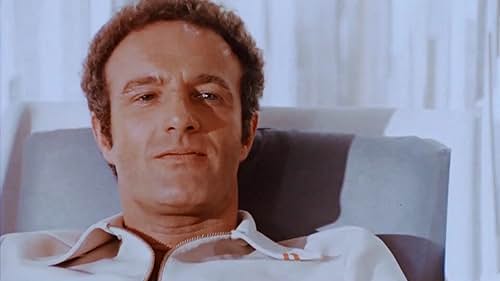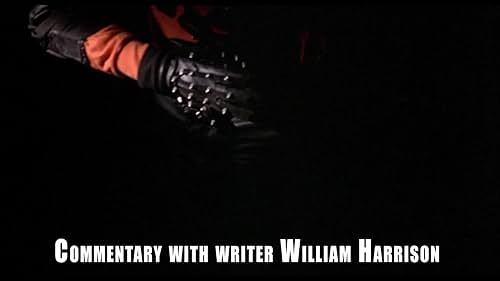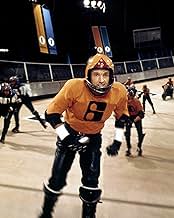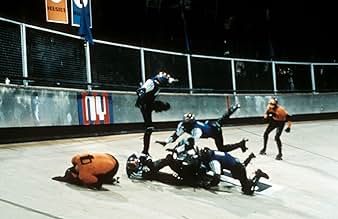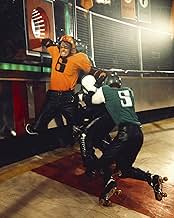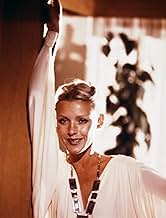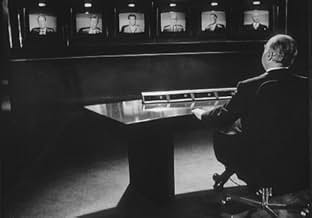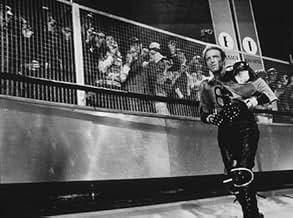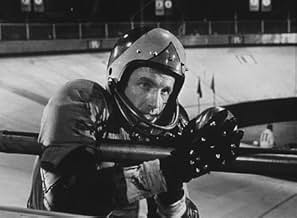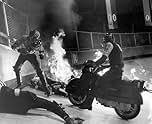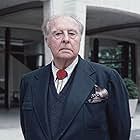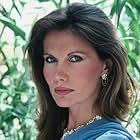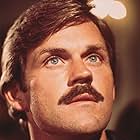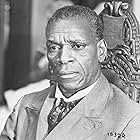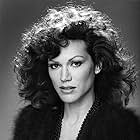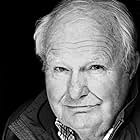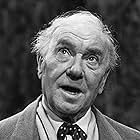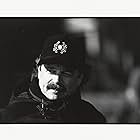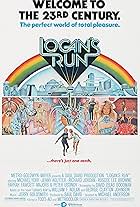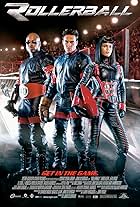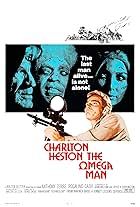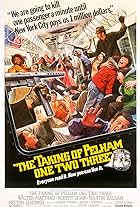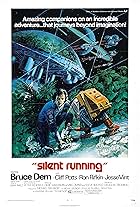In a corporate-controlled future, an ultra-violent sport known as Rollerball represents the world, and one of its powerful athletes is out to defy those who want him out of the game.In a corporate-controlled future, an ultra-violent sport known as Rollerball represents the world, and one of its powerful athletes is out to defy those who want him out of the game.In a corporate-controlled future, an ultra-violent sport known as Rollerball represents the world, and one of its powerful athletes is out to defy those who want him out of the game.
- Won 1 BAFTA Award
- 4 wins & 5 nominations total
- Bartholomew's Aide
- (as Rick Le Parmentier)
- Madrid Biker #1
- (uncredited)
- Houston Team Rookie
- (uncredited)
- Biker
- (uncredited)
Storyline
Did you know
- TriviaMany of the extras in the film received an additional wage in order to cut their fashionably long hair so the look of the film would not be tied to the era in which it was made.
- GoofsAt the beginning of the New York game, after many moments in the film where different characters have repeated that there would have been "no time limit", the scoreboard shows the countdown (starting from 20.00).
This is not actually a goof, as the game was still going to have 20-minute periods, but there was going to be no limit to the number of periods, hence "no time limit".
- Quotes
Bartholomew: Sweet dreams, Moonpie. That's a bad habit you've got there. You know what that habit will make you dream, Moonpie? You'll dream you're an executive. You'll have your hands on all the controls, and you will wear a gray suit, and you will make decisions. But you know what, Moonpie? You know what those executives dream about out there behind their desks? They dream they're great Rollerballers. They dream they're Jonathan; they have muscles, they bash in faces.
- ConnectionsFeatured in Brubaker (1980)
- SoundtracksToccata and Fugue in D minor, BWV 565
(uncredited)
Composed by Johann Sebastian Bach
Performed by Simon Preston and the London Symphony Orchestra
Conducted by André Previn
But in both films, we see the same powerful strategy: a complex, philosophical brain-twister beneath a deceptivly simple exterior. "Fiddler on the Roof" was seemingly a linear story about a struggling Jewish family's good & bad times. But the real meat of the story was about the conflict between old ways and new (tradition vs. progress). Here in "Rollerball" we have another seemingly linear story about an athlete in a violent, futuristic sport. But the real meat is the conflict of brutal human nature vs. suppression (again, a sort of "tradition vs. progress"). As with "Fiddler on the Roof", director Norm Jewison doesn't hit us over the head with any preachy sermon but instead leaves us to digest the situation.
"Rollerball" has the same powerful, brooding quality that we see in many of the 70s scifi masterpieces, like "THX 1138", "Soylent Green", "Planet of the Apes", "Blade Runner" (yeah I know that one was 1982), and the one that started them all, "2001: A Space Odyssey". Cold, sterile sets, disturbing situations and powerful use of silence characterize these films. By today's standards they might be considered slow, but depending on how you like your scifi, that might be right up your alley.
In a nutshell, the story is about a futuristic society that has largely done away with civilian violence. It has done this by "subsidizing" violence by way of a global pasttime: a hyper-violent sport called Rollerball. Note: as a parallel story, we learn that cut-throat corporate competition has been similarly squelched by the government creating monopolies. And thus society finds peace. Or does it? You can probably see the brilliant metaphors being woven here. This isn't an ordinary scifi romp, it's a powerful socio-political allegory. It cuts to the heart of human nature the way the great writers H.G. Welles, Mary Shelley and George Orwell did. No, you won't see a lot of laser battles, spaceships and aliens. But here you'll see an excellent example of what scifi was designed to do: comment on our current human condition by creating a fictional (extreme) scenario as a cautionary tale.
Excellent, and I mean EXCELLENT performances by James Caan (The Godfather, Misery), John Houseman (The Paper Chase, The Fog), Maud Adams (3 James Bond films), Moses Gunn (every 70s TV show from Hawaii 5-O to Shaft), and a particularly gripping performance by Pamela Hensley (Princess Ardala in "Buck Rogers" homina homina) make this an all-star powerhouse of 70s talent.
The music deserves a special mention of its own. From the opening notes of Bach's Toccata in Dm (the creepy "Dracula" theme) to Albinoni's haunting Adagio in Gm (check it out on YouTube... saddest song ever), "Rollerball" doesn't hold back.
They don't make 'em like this anymore. But there are a few modern scifi films that come close: "Moon", "District 9" and "Solaris" come to mind.
If you liked the films I mentioned in this review; if you liked the 70s classics "Catch-22" and "Coma" and "Stepford Wives"; if you like films that are both entertaining and works of art, do NOT miss Rollerball.
For laughs, after you watch Rollerball (1976), check out the remake done in 2002 ...and see how far we've come :/
Details
- Release date
- Countries of origin
- Language
- Also known as
- Роллербол
- Filming locations
- BMW Building, Munich, Bavaria, Germany(Energy Corporation headquarters)
- Production companies
- See more company credits at IMDbPro
Box office
- Budget
- $6,000,000 (estimated)
- Runtime2 hours 5 minutes
- Color
- Sound mix
- Aspect ratio
- 1.75 : 1
Contribute to this page


